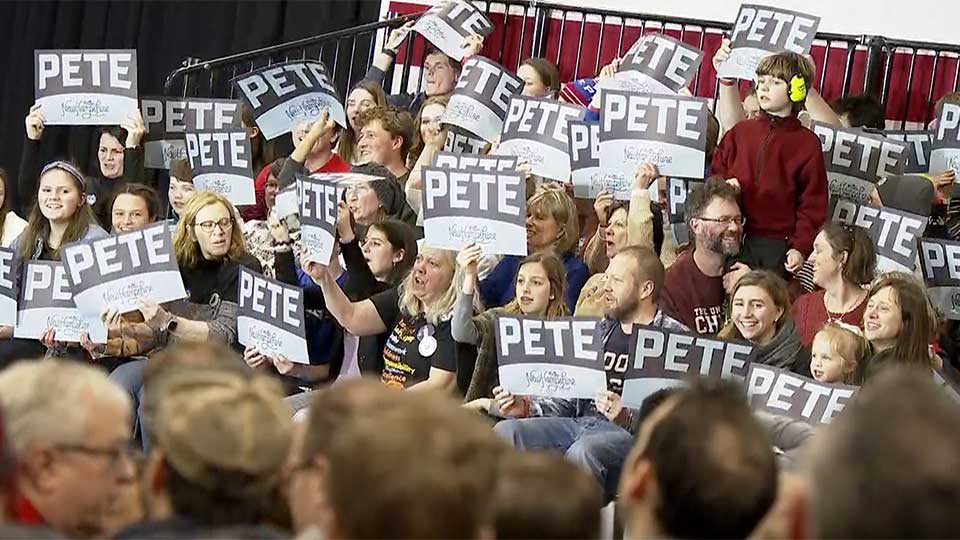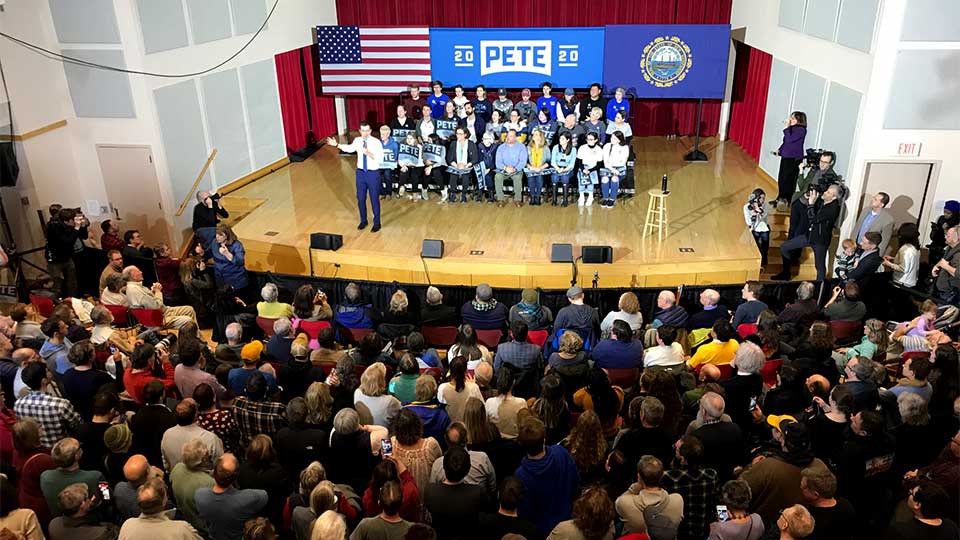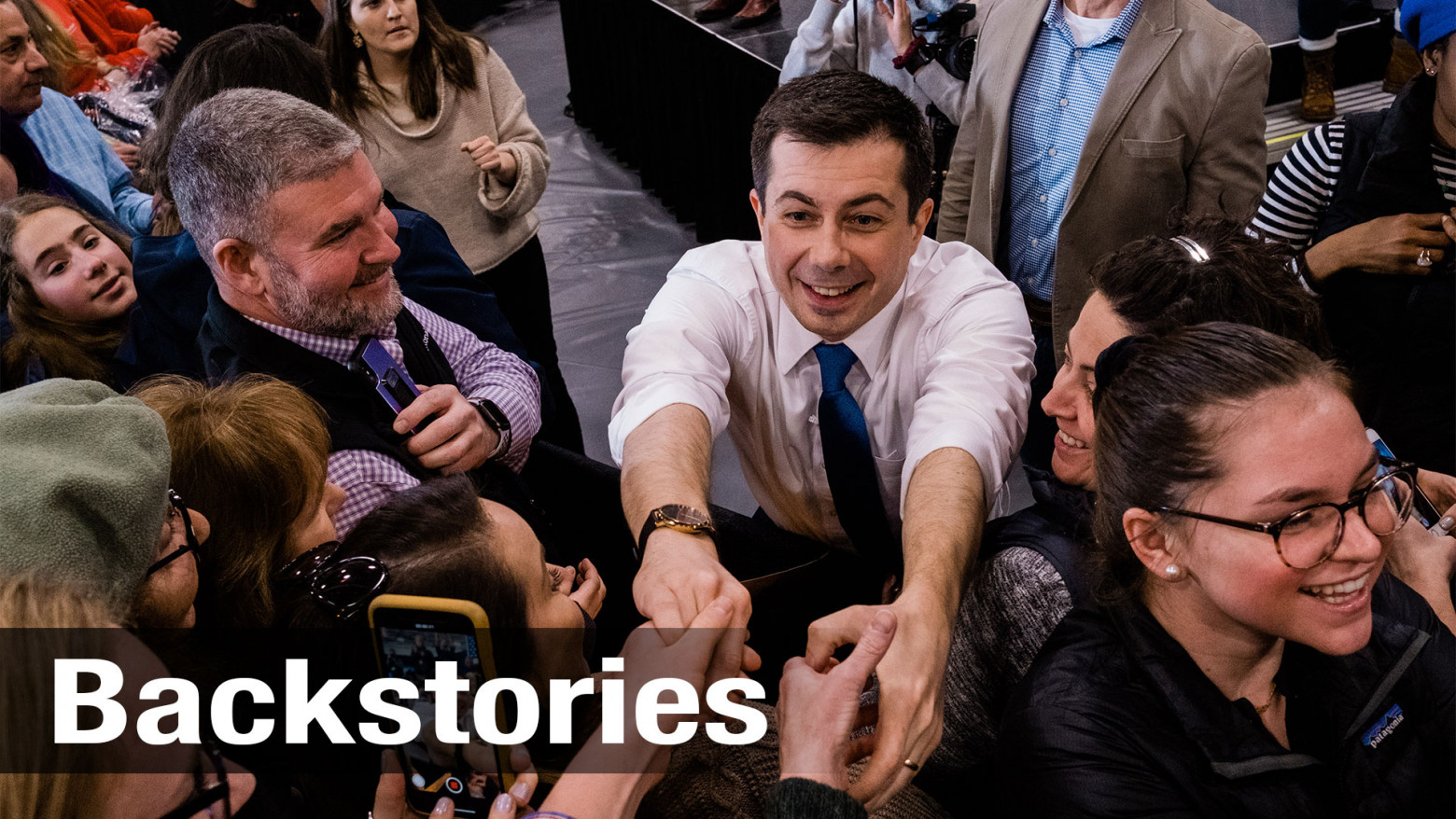Buttigieg emerges from his car to greet those waiting in line. He notes how similar the weather here is to that of his hometown, South Bend, Indiana, where he served as mayor.
The crowd tonight is a mix of die-hard supporters and undecided voters. It's the latter group that Buttigieg has been trying to woo ahead of the New Hampshire primary. The state is one of a handful where independent voters outnumber ones affiliated with either party.
Buttigieg has been targeting these undecided voters with an overwhelming amount of ad exposure. After winning the Iowa caucuses, his campaign was flooded with $406,000 in donations from supporters in New Hampshire, allowing him to spend freely on ads. He has reportedly invested a whopping $3.7 million on radio and television spots in the state.
Message of unity
Buttigieg would go on to finish second in the primary to Bernie Sanders, the senator from neighboring Vermont. While Sanders remains the favorite for the eventual nomination, Buttigieg's enduring success continues to surprise many political analysts. Speaking to supporters at events throughout New Hampshire, I noticed that a large part of his appeal seemed to come from his message of inclusivity.
"Pete has a message of hope and inclusion," said Matthew Buonomano, 51. "I'm historically a Republican voter, but Pete has a very positive message. I'm very excited to support him."
It often feels like Buttigieg is speaking directly to voters like Matthew in his speeches. He constantly stresses that he is the only candidate who can draw support not only from Democrats, but from the entire country.
Buttigieg spoke of his belief in the power of unity at an event in the town of Lebanon, in western New Hampshire.
"At a divided time in our country, I don't think we could take the risk of excluding anybody from this," he said. "I think we're going to defeat this president by inviting everybody to be at our side."

Young and fresh
It's not just Buttigieg's message that's attracting supporters. His age sets him apart in a field where three of his main rivals are in their 70s. At 38, Buttigieg is vying to be the youngest president ever, and his supporters say he is a welcome change to a political landscape dominated by old and familiar names.
"Pete is a fresh face," says Kathy Halverson, 71. "I just think he would have more energy."
"He's got a shiny new coat to him, like a new car smell," says John Hale, 20, a student at Keene State College. "[Former vice president Joe] Biden has been around for however long. They're very similar in terms of messaging. But Biden has this aura of being establishment, where Buttigieg doesn't really have that yet."

Keeping up the momentum
Buttigieg has exceeded expectations so far, but it is unclear whether he can maintain this level of success the rest of the way. The upcoming states on the primary schedule present a set of challenges that will be uniquely difficult for a candidate like him:
- African American support: Buttigieg has been slammed for his poor record on discrimination and inequality during his time as South Bend mayor. This is one of the reasons he has such poor numbers among African American voters, an important bloc in a number of upcoming primaries.
- Lack of experience: Buttigieg has by far the thinnest résumé of any of the remaining contenders. The people I spoke to at his events repeatedly brought up this lack of experience as a concern, especially in a matchup with Biden.
- Splitting the center: Buttigieg needs to consolidate his position as the leading moderate candidate by holding off competition from Biden and Minnesota senator Amy Klobuchar. The surge in support for Klobuchar in the New Hampshire primary does not bode well for him in this regard.
- Answering critics from the left: Buttigieg was once touted as a promising figure of the left. In the past, he expressed admiration for Sanders and support for a universal healthcare system. Critics say he has shifted to the center in an effort to broaden his political appeal. He has also come under fire for his time at management consultant firm McKinsey and Co, and for money his campaign has received from Wall Street donors. He will need to once again prove his progressive credentials if he hopes to chip away at the support bases of Sanders and Massachusetts senator Elizabeth Warren.
Buttigieg's rise has been swift and unexpected. And regardless of whether he ends up winning the nomination, he will be a prominent figure in American politics for years to come. But if the mayor from Indiana hopes to end up in the White House, he still has to overcome many hurdles and convince many people of his message.

